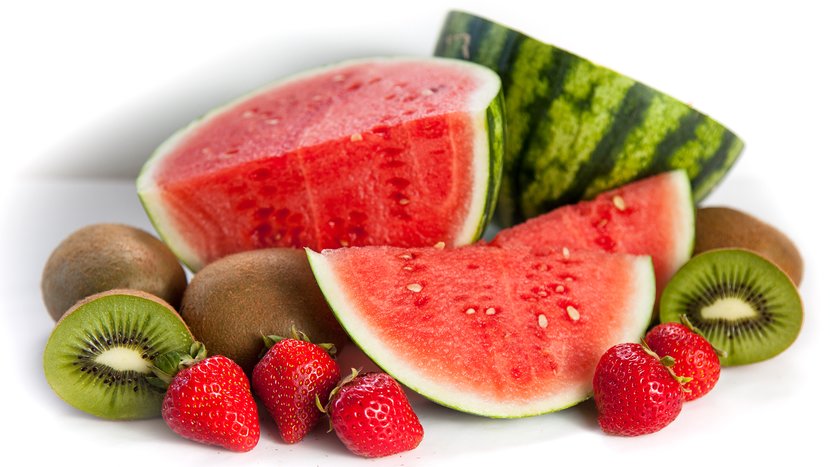
While you’ve been busy putting in some major sweat sessions at the gym and eating protein-rich and metabolism-boosting foods, there’s a good chance you’ve been eating plenty of fruits as well. If you typically go straight for the apples and bananas and never stray from your norm, you’ll want to take a look at this list of the top 10 fruits that are even healthier than you think.
1. Papaya

You may not find these fruits growing anywhere near your apple orchards, but this tropical fruit offers a ton of health benefits. MSN discusses how papayas are high in vitamin C, which helps support your immune system, protect against arthritis, and prevent cardiovascular disease. They are also rich in fiber and antioxidants, and this together makes the papaya an effective fighter of cholesterol build-up in the arteries, which again works to prevent heart disease. If you’re feeling hungry, this fiber-rich fruit offers a filling snack without a ton of calories — there are only 67 calories in one small fruit.
Not only are papayas rich in vitamins, but they’re also great for relieving menstrual symptoms — the enzyme in papaya, called papain, assists in regulating menstrual flow and easing cramps. Try reaching for this fruit the next time you experience pain associated with your monthly cycle.
2. Kiwi

The kiwi, or kiwifruit, is small in size but big in nutritional impact. Kiwis are considered to be nutrient-dense, which makes them high in nutrients and low in calories, according to Medical News Today. This little fruit contains plenty of vitamin C to support the immune system and fight heart disease and cancer. Kiwis are also rich in fiber and potassium, which are both helpful in supporting the heart. Mark Houston, MD, MS, associate clinical professor of medicine at Vanderbilt Medical School and director of the Hypertension Institute at St. Thomas Hospital in Tennessee, says that one of the most effective ways to reduce heart disease risk is to increase potassium intake and decrease sodium. Consuming kiwi in place of other salty treats throughout your day can offer you a tasty and nutritious bite that can really boost your health.
There is also evidence to suggest that eating kiwis may improve the quality of sleep in adults. Studies show that adults who have reported disturbances in their sleep, kiwis have helped them fall asleep and remain asleep for the duration of the night.
3. Grapes

Grapes | iStock.com
Grapes may not be on the top of your list when you think about health foods, but you may want to start grabbing them for a healthy and sweet treat. Organic Facts describes how grapes are high in vitamins A, C, and B6, and they are high in minerals like potassium, calcium, and iron. If you’re looking to increase your bone strength, the copper, manganese, and iron in the grapes can help strengthen bones and prevent osteoporosis. In addition to aiding in bone health, grapes are great for the heart, as they help to prevent blood clots and ultimately can help prevent heart attacks.
There are also flavonoids in grapes, which are antioxidants that help to slow down aging and reduce the negative effects of free radicals. Resveratrol and quercetin, the two main types of flavonoids found in grapes, help to filter the blood and free your body of harmful toxins that can threaten your health.
If you’re feeling fatigued, then consider drinking some fresh light or white grape juice — the iron content in this type of juice is great for boosting energy and helping those who suffer from anemia and should be consumed over dark grape juice.
4. Dragon Fruit

You can find dragon fruit if you know where to look | Spencer Platt/Getty Images
Dragon fruits are more than just beautiful to look at — they are also full of beneficial nutrients, and if you haven’t tried one yet, you may want to. Mercola describes dragon fruits as having a number of benefits such as high vitamin C content, multiple B vitamins, protein, carotene, and good fatty acids. This fruit also contains calcium to support bones and teeth, and iron for an energy boost.
Captin, a phytochemical that is used as medication for those who have heart problems, is present naturally in the dragon fruit itself. The oil found in the seeds of the fruit is also helpful for those with digestive issues, as it acts as a natural and mild laxative. Not only do the seeds offer digestive support, but they are high in omega-3 and omega-6 fatty acids, which can help to lower the risk of cardiovascular disease.
The brilliant red coloring of the fruit comes from lycopene, which can also help reduce the risk of developing prostate cancer.
5. Blackberries

Blackberries cooking in a pan | iStock.com
It’s no secret that berries are good for you, but the blackberry may just be the king of them all in terms of nutrition. The Huffington Post tells how the color of blackberries gives them away from the start — their color shows that they are high in antioxidants, and they actually have one of the highest antioxidant levels of all fruits. They are high in vitamin K, C, A, and B vitamins as well as calcium, iron, magnesium, and potassium. Blackberries are great for supporting the health of the heart, skin, and bones.
If you’re having intestinal troubles, then blackberries may be a good choice of snack for you as well, as the tannin present in these berries works to soothe inflammation in the intestines and provide relief for those experiencing diarrhea. Though the berries themselves are delicious, the leaves and bark of the plant are not without their benefits. Traditionally, the leaves of the blackberry plant have been used to treat inflammation in the gums, and the leaves can also be used to make tea.
6. Avocado

Sliced avocados in a bowl | iStock.com
Though not the sweetest item on the list, avocados are known for their creamy texture and delicious contribution to Mexican cuisine. Better yet, they are one of the healthiest fruits, boasting high levels of vitamin K, C, B5, B6, and E, as well as high levels of folate and potassium. Authority Nutrition says that an avocado has more potassium than a banana, and they contain no cholesterol or sodium.
Avocados are high in fat — in fact, they are one of the fattiest plant foods to exist, but they are full of healthful monounsaturated fats that actually support heart health. Most of the fat found in an avocado is oleic acid, which has been shown to reduce inflammation and have positive effects on genes that are linked to cancer. Avocados have also been shown to reduce bad cholesterol levels and increase good cholesterol, resulting in overall better heart health.
In addition to being great for the heart and loaded with vitamins and minerals, avocados have a healthy amount of fiber as well. Soluble fiber helps lower cholesterol and supports intestinal health, and 25% of the fiber in an avocado is soluble.
7. Apples

Apples on a cutting board | iStock.com
If you’re used to walking right past the apples in the produce section, then it’s time to stop and pick up a few. Best Health explains apples, particularly Red Delicious and Granny Smith varieties, are high in antioxidants. If fiber is what you’re after, then eating a medium-size apple offer 4 grams of pectin, which is a type of fiber that is hugely beneficial to the body.
Apples may even help with memory and boost brain function. According to research performed by the University of Massachusetts Lowell, animal research suggests apple juice consumption may boost the production of acetylcholine in the brain — a neurotransmitter that assists with memory. Those who study Alzheimer’s widely believe acetylcholine can help slow the effects of the disease.
In addition to helping the brain, apples may help ward away cancer, decrease the risk for diabetes, and protect against Parkinson’s.
8. Bananas

A bunch of bananas | iStock.com/anujaree
Whether you like to eat them as they are or slather them in peanut butter or chocolate, bananas are a favorite among gym-goers — and for good reason. Laura Flores, a nutritionist based out of San Diego, tells Live Science bananas are full of pectin, a natural fiber, and potassium. Flores adds this fruit also has high levels of antioxidants that can protect against free radicals, magnesium, and vitamins C and B6.
Bananas are a great snack for those who aim to lose weight because of the fiber content. They’re also filling and can help sustain fitness lovers through their workouts at only 100 calories a piece. This fruit is helpful for those who suffer from depression — bananas are high in tryptophan which is then converted to serotonin, a compound in the brain that boosts your mood.
As far as cancer is concerned, one study from 2005 shows women who ate more than five servings of fruit daily over roughly 13 years had a decreased risk of kidney cancer by up to 40%. According to the study, bananas offered the most protection.
9. Cherries

Bowl of cherries | iStock.com
Stock up on cherries when they’re in season — this delicious fruit is incredibly nutritious. Stella Metsovas, B.S., Mediterranean and diet expert, tells Medical Daily cherries are well-known for their anti-inflammatory benefits, which could explain why there’s been a huge boost in consumption over the years.
The University of Michigan Health System studied tart cherries and found that the fruit can provide cardiovascular benefits and reduce the risk of stroke. Cherries may actually help reduce the risk of colon cancer as well because of their phytochemicals and dietary fiber content, says The American Institute for Cancer Research.
If you’re having trouble sleeping through the night, then try having a few cherries before you go to bed. Cherries are a natural source of melatonin, the hormone that helps keep the body’s sleep-wake cycles regulated. Eating cherries may help you get more quality sleep as well.
10. Grapefruit

A grapefruit cut in half | iStock.com/Angelika-Angelika
Grapefruits have been a staple in many dieter’s breakfasts, but even if you’re not going low-cal, they’re a fruit you should add to your diet. The World’s Healthiest Foods says grapefruits, like all citrus, are high in vitamin C. This vitamin boosts the immune system and can help reduce the severity of certain inflammatory conditions like asthma, osteoarthritis, or rheumatoid arthritis.
Grapefruits are a beautiful pink or red color, and that’s because of the lycopene. This phytochemical can help reduce prostate cancer risk and fight damage from free radicals. Limonoids, another phytochemical in grapefruits, can help inhibit the formation of tumors, and a study from the British Journal of Nutrition shows grapefruit juice can help prevent kidney stones. If you’re not keen on the grapefruit’s tart taste, try adding a bit of honey or brown sugar over the top before enjoying.
[“source-ndtv”]










